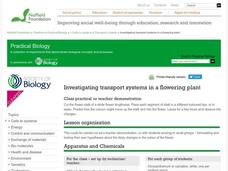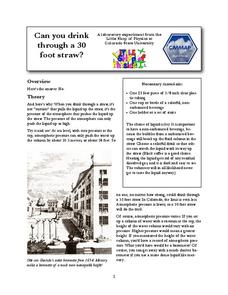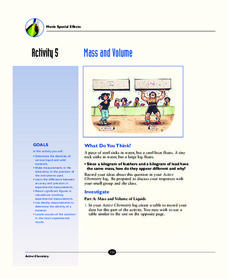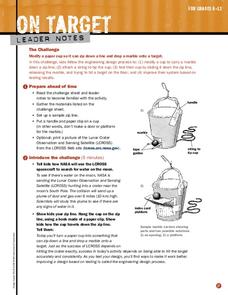National Wildlife Federation
The Water Cycle
Observe the water cycle from the comfort of your classroom with this excellent earth science experiment. Working collaboratively, young scientists first create terrariums complete with hills, plants, lakes, and an atmosphere,...
Teach Engineering
Water Remediation Lab
Water filtration — that's pure genius! Groups test the ability of a water filter to purify water by running chlorine contaminated water through a filter and measuring the chlorine concentrations as they filter the water. They then graph...
NASA
The Case of the Wacky Water Cycle
Join the tree house detectives in learning about the processes of the water cycle, water conservation, water treatment, and water as a limited resource.
Nuffield Foundation
Observing Water Moving Through Plants
We know plants assist in the water cycle, but how do plants get water from the ground into the air? Through a series of demonstrations or labs, scholars observe the movement of water through plants. They microscopically view the cells...
Earth Day Network
Filtering Water
See the water filtration system up close with a fun science experiment. Young scientists work for several class periods to design a water filter using household objects, and then decide which filter material would be most effective in...
Kenan Fellows
Microorganisms in Pond Water
That is living in the water? Groups of two to three view pond water with microscopes in order to find microorganisms. They draw pictures of the ones they find in their slides. The groups compare their drawings to pictures of common pond...
Royal Society of Chemistry
A Reversible Reaction of Hydrated Copper (II) Sulfate
How can removing water change the color of a substance? Lab partners remove the water of crystallization from hydrated copper (II) sulfate, record their observations, then rehydrate the solid. The resource is printable and contains ideas...
University of Chicago
Don't Be Too Flaky
Snow, ice, and water are all composed of H2O. Does that mean they all have the same volume? Discover the ways that the densities of these substances determine their volumes, and how they change based on their current states of matter....
Colorado State University
Why Are Clouds White?
Is it possible to change the color of clouds? A three-part activity explores the scattering of light by the water droplets that make up clouds. After observing a demonstration, curious scholars conduct their own investigations of the...
Royal Society of Chemistry
Investigating Temperature Changes on Evaporating Liquids—Microscale Chemistry
Is there more to evaporation than just less liquid? Show young scientists the energy transformation that occurs during a phase change through a series of simple experiments. Lab partners place drops of water, ethanol, and ethoxyethane on...
Nuffield Foundation
Investigating Transport Systems in a Flowering Plant
Some weddings have flowers in a unique, unnatural color to match the theme. Young scientists take part in this process to learn about the function of the xylem as they observe colored water moving through a flower. Then, they experiment...
Wilderness Classroom
Ocean Life
Our oceans are composed of many complex relationships. Young oceanographers explore relationships between organisms, understand the world ocean's currents, and discover the effects of water pollution and how it behaves. There are three...
It's About Time
Solutions, Suspensions, and Colloids
Chemists are frequently in suspension, but not because they misbehave! Scholars mix various items with water to create solutions, suspensions, and colloids. They test each one to determine their differences and properties. The resource...
It's About Time
Sounds from Vibrating Air
Take note, or notes, as the case may be. A scientific music lesson is the third in a set of eight covering waves and instruments. Scholars use straws, test tubes, and water to create various wind instruments. Then, they read and answer...
It's About Time
Volcanos and the Atmosphere
In the summer of 1815, snow fell every month in New England. Was this related to the volcanic eruption of Tambora in Indonesia earlier in the year? Young scientists design their own experiments to research the long-term effect a volcanic...
Teach Engineering
Chromatography Lab
Groups use alcohol and chromatography paper to separate the color components of black ink. The purpose of the activity is to allow the class to become aware that mixtures exist in hidden places.
Teach Engineering
Density Column Lab - Part 2
Groups suspend objects within layers of liquids to determine the densities of different liquids and compare them to the densities of objects calculated in Part 1. The groups then carefully test their calculations by layering the liquids...
Colorado State University
Can You Drink Through a 30 Foot Straw?
Drinking straws are a pretty simple device ... or, are they? Explore the possibility of sipping a beverage 30 feet away with an engaging activity that's sure to keep pupils guessing. Just place a long piece of plastic tubing in a glass,...
Royal Society of Chemistry
A Microscale Acid-Base Titration
Watch as acids and bases put smiles on their faces. Young chemists learn the concept of acid-base titration firsthand in a microscale experiment. Working groups collaborate, titrate, then use their data to determine the concentration of...
Kenan Fellows
The Effects of Environmental Conditions on Aquatic Organisms
What kind of experiment can your class do to how observe the environment effects on organisms? Groups design and conduct lab experiments to learn about the effects of the environment on aquatic organisms. Based upon knowledge gained from...
It's About Time
Mass and Volume
Don't be so dense that light bends around you; study the relationship between mass and volume instead. Young chemists measure the density of a variety of liquids and solids. A reading passage and analysis questions introduce pupils to...
Colorado State University
Can it Really Rain Fish and Frogs?
You've heard of it raining cats and dogs ... but what about fish and frogs? It turns out, one scenario is much more likely than the other! Intrepid weather investigators examine the curious behavior of waterspouts using a leaf blower,...
NASA
On Target
NASA's LCROSS mission is dropping a probe into a lunar crater. Groups design a system to travel down a zip line and drop a marble onto a target in the classroom. The groups then modify their designs based upon testing.
DiscoverE
Electrical Liquids
Liquid or not, here comes the electricity. Scholars test the conductivity of various substances using a circuit that includes a light bulb. If the light bulb lights up, then the liquid is a conductor. What a bright idea!
Other popular searches
- Water Cycle
- Water Pollution
- Water Cycle Diagram
- Water +Science
- Properties of Water
- Bodies of Water
- Water Conservation
- Water Pollution Worksheets
- The Water Cycle
- Water Cycle Experiment
- Water Cycle Activities
- Water Cycle Stages

























